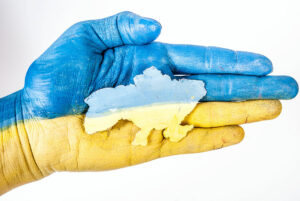A YEAR after Vladimir Putin launched his invasion of Ukraine, many observers in the West are finally waking up to the reality that most of the world doesn’t view the war the way they do. Western sanctions, undermined by non-cooperative Asian, African, and Latin American countries, have not only failed to deter Russia from devastating Ukraine. They have helped Vladimir Putin pose as an anti-imperialist and present Russians to people in the Global South as fellow historical victims of the West.
A new report by the European Council on Foreign Relations warns Western leaders that they should abandon their high-flown rhetoric — “don’t make it all about democracy” — and instead seek to build a new world order in partnership with India, Turkey, Brazil, and other emerging powers. Western leaders should treat these countries as “new sovereign subjects of world history.”
Fair enough. However belated, a mainstream Western reckoning with the diverse historical experiences and opinions of the majority of the world’s population can only be welcome. In rushing to woo the Global South, however, Western policymakers risk repeating past errors.
It is true that the West “urgently” needs, as Timothy Garton Ash, one of the report’s authors, says, “a new narrative that is actually persuasive to countries like India, the world’s largest democracy.”
But what would this narrative consist of? And to whom should it be addressed? Ordinary citizens or elites? Civil society or governments? Would the audience for this urgent new narrative include Indian Muslims and Turkish Kurds, two large minority groups maltreated by repressive nationalist-imperialist projects in India and Turkey, respectively?
The report doesn’t say. However, its recourse to a hollowed-out phrase, “the world’s largest democracy” to underline India’s importance to the West raises suspicions. The State Department’s spokesperson deployed the same phrase last month, adding the adjective “vibrant,” when asked to comment on Prime Minister Narendra Modi’s government’s banning of a two-part BBC documentary about the treatment of Indian Muslims.
At least some Western governments and opinion-makers have decided to ignore or gloss over the assault on democratic rights in nations such as India and Turkey. While the reasons are complex — and have as much to do with the need for allies in what many see as a generational struggle to contain a rising China — Western officials clearly fear that overt criticism will only intensify these countries’ de facto support for Russia.
This is ominously reminiscent of Western attitudes during the Cold War toward many non-Western countries. Violations of human rights were ignored, and autocratic rulers were tolerated, even fortified, so long as they did not undermine the free world’s efforts to contain the Soviet Union.
Too many societies came to suffer from the Cold War’s ugly assumption that some people deserve freedom and dignity more than others. The popular suspicion of Western rhetoric about democracy that spread then across Asia, Africa, and Latin America has only become deeply entrenched since. It partly explains sharply divergent public opinions on the Ukraine war in the non-West.
Today, everyone is a lot more wised-up, politicized, even cynical, than during the Cold War, thanks to intensified communications and a broader awareness of world affairs. The stakes are also much higher, with politics and economies in turmoil everywhere due to extreme economic and geopolitical inequality, and environmental emergencies.
The West could endlessly flatter the illiberal leaders of the Global South as great historical actors and vibrant democrats and might still fail to reorient their attitudes in its favor: India joined China in abstaining last week from the United Nations vote to condemn Russia’s invasion.
Instead of yet again expediently legitimizing authoritarian rulers and further damaging its credibility, the West would be better off maintaining its commitment to democracy — and not just rhetorically. It is too easy to throw around the word “democracy” along with bombastic adjectives such as “largest” and “vibrant.” A harder, but essential, task is upholding the core democratic ideals of equality and justice — everywhere. Certainly, those who claim to be fighting for freedom and dignity in Ukraine should not be willing to countenance their destruction in India, Turkey, and other likely partners of the West.
BLOOMBERG OPINION
